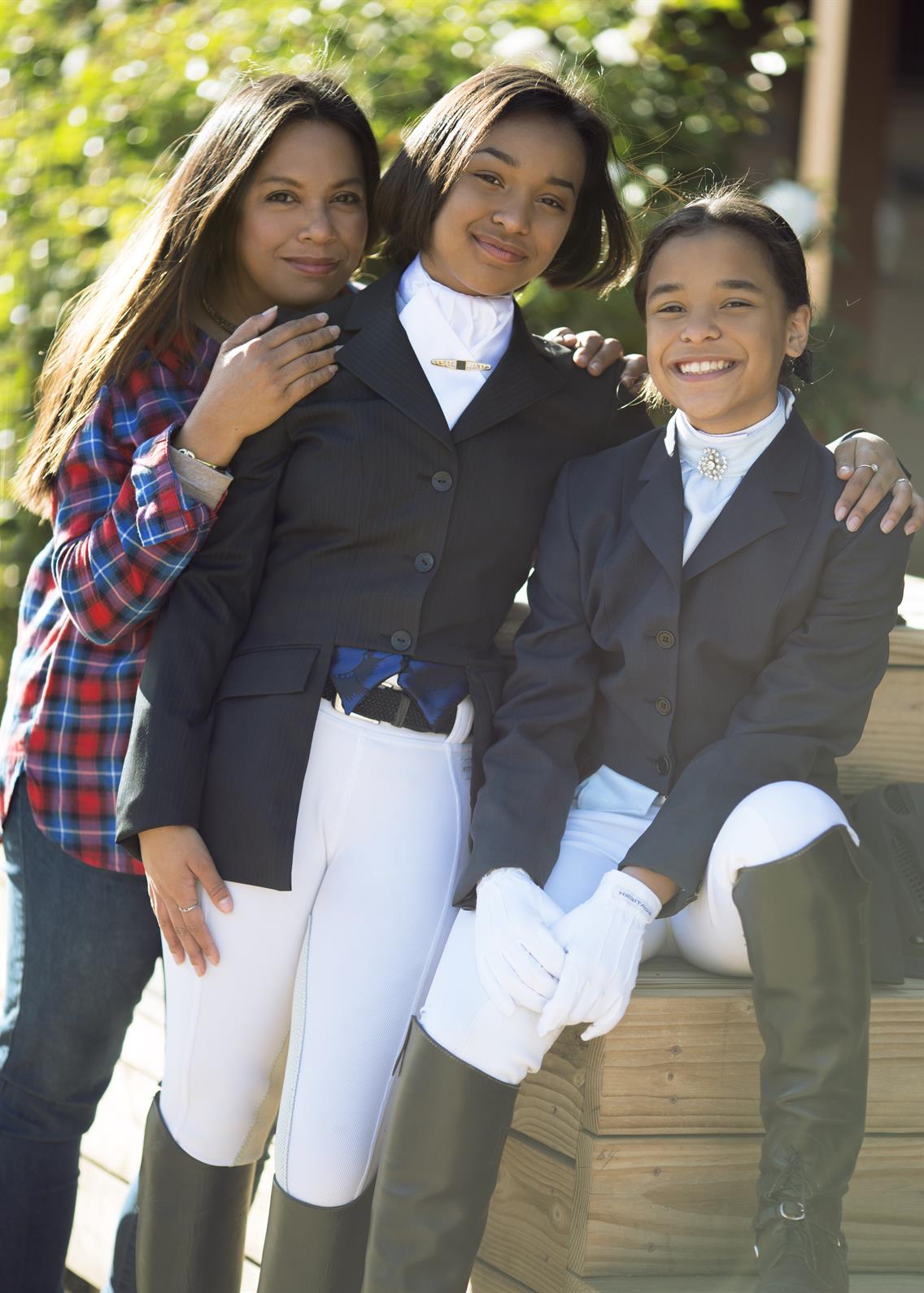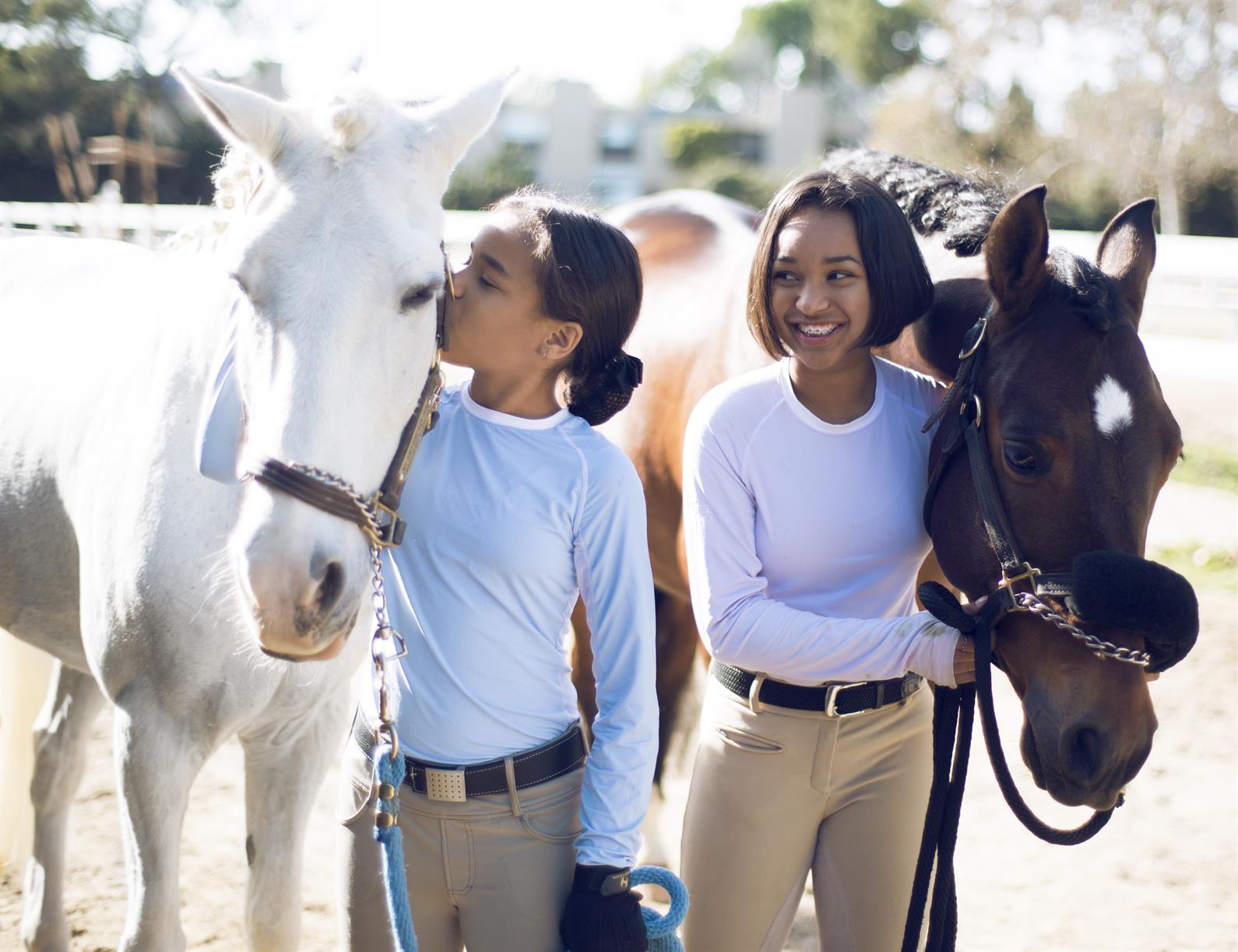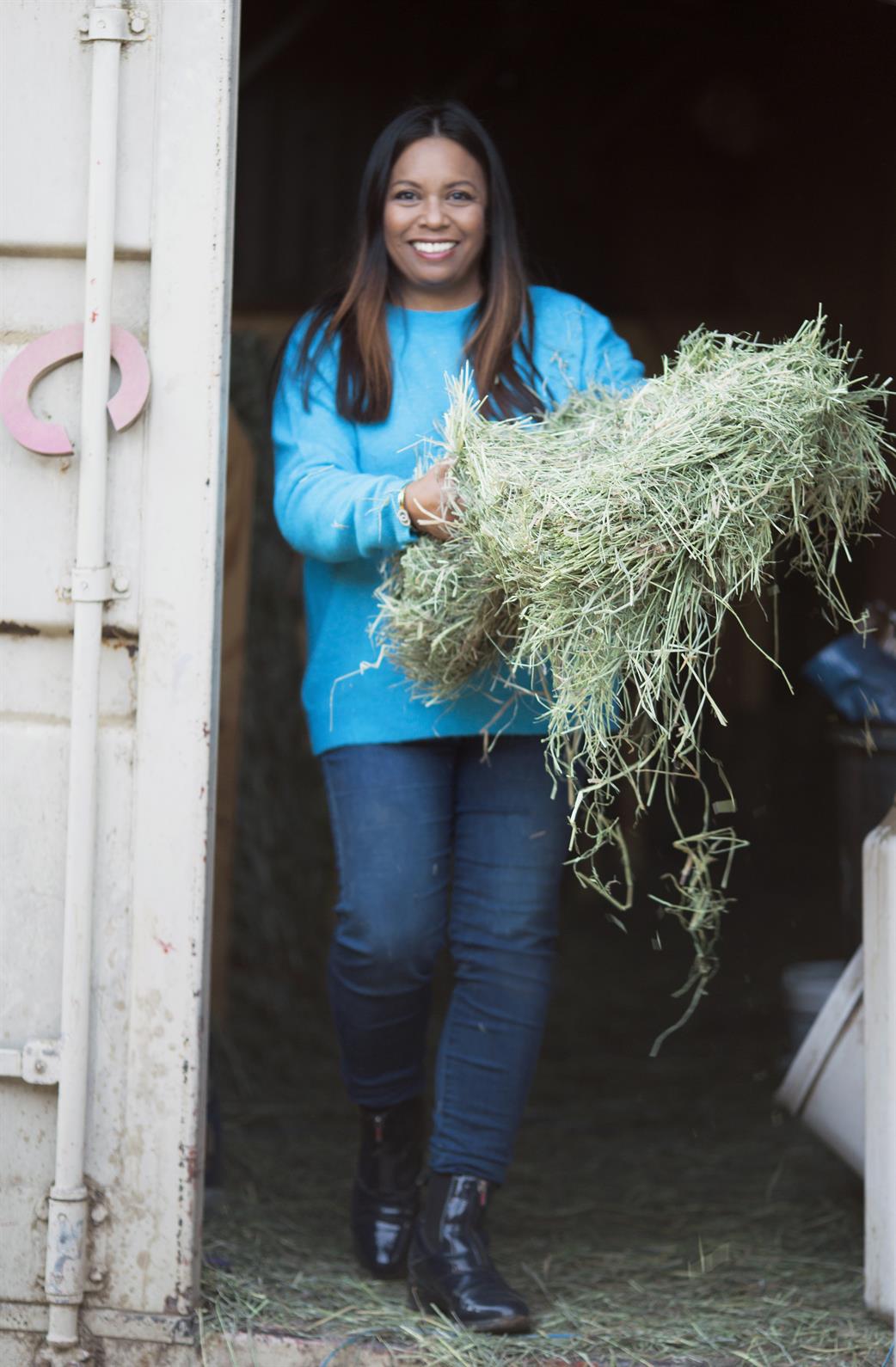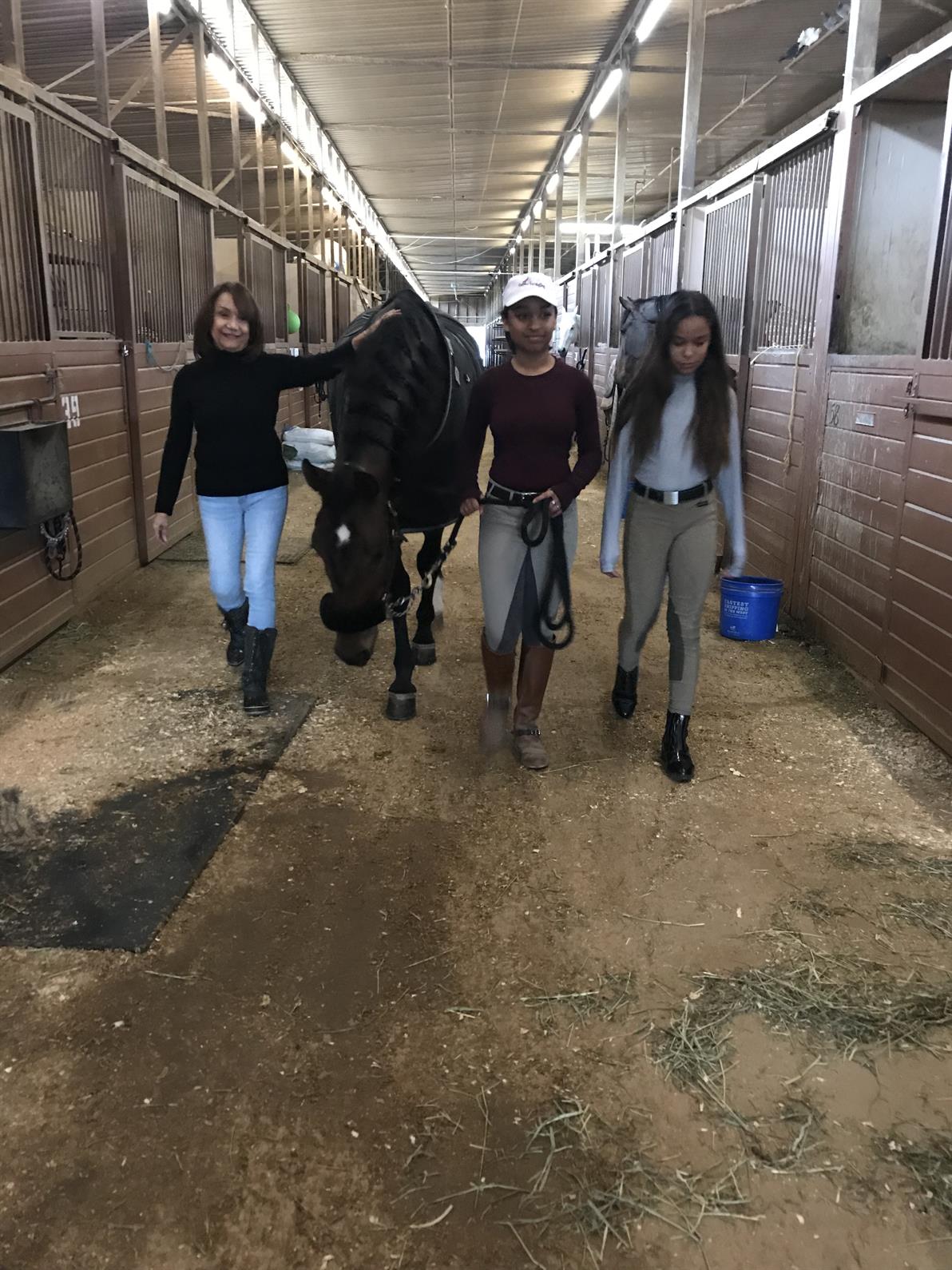
Photo credit: Gina Falcone/Courtesy of Carlyn Nuyda-Calloway
In families where parents and children both ride, that experience can be especially fulfilling. That’s what California-based fashion designer and Meditation Studio owner Carlyn Nuyda-Calloway and her daughters, Eloise and Faye, have found. The three are the latest in a line of female equestrians in their family who have shared the connection with horses down the generations, from the East Coast of America to the Philippines and now in Southern California.
“For me, it creates such a strong bond with them. I get to share their joy, and they get to share mine,” Carlyn said of equestrian life with her daughters. “It’s also about teamwork. Sometimes we disagree, but, because there’s a horse involved, we have to agree to disagree. We have to come to a point where we’re all in this together. We are able to finish each other’s sentences beyond the barn partly because we spend so much time together in the barn. It’s made us so much closer as a family. Although my husband is allergic to horses, he does come to the shows and he does his part, too. But the whole thing has definitely created a synergy between me and my girls.
“And it’s just so much fun!”
“Whenever I’m at the barn, and especially when I’m riding, it reminds me that equestrianism is the only sport where your equipment can decide not to cooperate,” said Eloise, 14. “And you can’t really get mad at them when they go against what you want, because it doesn’t really help. I think it teaches us all to sit back and go with the flow. It teaches us to look at the bright side of things and be satisfied with what we have and work through it, patiently.
“It’s definitely strengthened our relationship,” she added. “Being there forces us to ask each other for help. You know, I wouldn’t always want to ask my little sister for help outside the barn, because that’s the way siblings are with each other. But being at the barn, we’re all equal and friends.”
Faye, 11, explained it succinctly. “At the barn, everything is happier!” she said. “We get along much better and can relate to things much better—not saying that we don’t do that at home, but it just feels so free at the barn.”
Carlyn’s mother, Rocio Nuyda, now retired, also frequently accompanies her daughter and granddaughter to the Los Angeles Equestrian Center, where Eloise and Faye ride. In fact, the love of horses has been passed down through several generations of women on Carlyn's father's side of the family.
“I’ve always been a horse girl for as long as I can remember,” said Carlyn, who grew up in the Philippines. “My grandmother was an amazing horsewoman, and she was the one who influenced me to really love and embrace that whole world.”

Photo credit: Gina Falcone/Courtesy of Carlyn Nuyda-Calloway
Carlyn came by her love of horses honestly. Her grandmother, Evelyn Rollins Nuyda, brought equestrianism with her when she moved from Washington, D.C., to the Philippines after marriage. “She was an English hunter jumper rider, and she also did steeplechases,” Carlyn said, adding that her grandmother competed for the Philippines in competitions both as an equestrian and as a swimmer. “We never had the opportunity to ride together. I was a young girl when I watched her ride at the Manila Polo Club.”
One day her grandmother told Carlyn, then about five or six, “Someday you’re going to want to ride your own horse.” She handed the girl a belt, as if it were a pair of reins. Holding the ends of the reins—where a bit would go on a real set of reins—Carlyn’s grandmother tugged slightly against Carlyn’s hands. “’That’s what you call contact,’ she said. Then she pulled the belt, and the leather slipped out of my hands. She said, ‘When that happens, you know longer have contact. Now I’ll show you how to hold the reins.’ She put the belt between my three fingers and my pinkie, and then she tugged again, and this time the ‘reins’ didn’t slip. She taught me about contact and also about feel, about give and take. I remember that.”
Throughout much of her childhood, Carlyn’s riding centered around ponies rented for the Christmas holidays. “I would practice that contact my grandmother taught me,” Carlyn said, recalling that her grandmother’s instruction was to use the hands only when necessary, and after applying the seat and leg first.
“In my mind, on those ponies at Christmastime I was a grand prix rider!” Carlyn recalled. “I could be riding the shaggiest pony on an old Western saddle, but I didn’t care—I thought I was a grand prix rider.”
As a young adult, now a resident of Los Angeles, Carlyn began riding lessons as a hunter jumper at the Traditional Equitation School at the Los Angeles Equestrian Center—always mindful of her grandmother’s words on the importance of soft, quiet hands. She later tried some combined training with trainer Linda Bierma, adding beginning dressage to her riding experience, and leased a Hanoverian mare named Schwann. But when she got pregnant with her first child, Eloise, she took a break from the saddle.
Happily, the girls—first Eloise and then Faye—showed signs of loving horses from an early age. “I waited until they were both old enough to start riding with me, and then we started riding together on rented horses. It was my way of getting back to horses and staying all together.”

Photo credit: Gina Falcone/Courtesy of Carlyn Nuyda-Calloway
Eventually, the family fell in love with a Tennessee walking horse named Dixie, who became a horse of a lifetime for Carlyn and her daughters—and found her "forever family," as Carlyn puts it—after trainer Dana Kanstul allowed Carlyn to adopt the mare.
“The moment I got on Dixie, I felt this rush that overwhelmed me,” Carlyn explained. “It was unlike anything I’ve ever felt in my life, a surge of warm energy. I could feel her talking to me. I fell in love with her. And I knew this was the horse that was going to teach my children to love the whole experience of horses.
“I don’t think they would have become the horsewomen they are without her,” she continued. “She taught them humility and about being gentle and being kind. That was the gift she gave us: to have that reverence for the horse and to understand the privilege of being on their backs. That is not to be taken for granted.”
Eloise and Faye blossomed as young equestrians in their own right, earning blue ribbons or high-point awards in disciplines as varied as saddle seat, Western and English pleasure and equitation, and dressage. Dixie died last October after a long and happy life, but the happy experiences she gave Carlyn and her children have carried on.
Eloise’s focus is now on dressage, in which she has recently been showing at Training Level with her 10-year-old Andalusian, Robusto AF. The family bought “Robbie” from Nancy Latta of Amandalusian Farm.
“The breed is known not only for its long history and beauty, but also for its versatility,” Carlyn said. “They can do dressage, saddle seat, hunt seat, Western—you name it. Our thought was that, since this is her first horse and dressage is very new to her, we’d consider buying a horse who could change his job title in case dressage didn’t turn out to be her cup of tea. He’s absolutely stunning and very kind, and the Andalusian temperament really suits our personalities as a family.”
And dressage suits Eloise well, the young rider says. “I guess you could say this about pretty much every equestrian sport, but it’s the connection between the horse and the rider,” Eloise said. “But, for some reason, in dressage it seems so different. One day I watched a video of Charlotte Dujardin riding Valegro, and I don’t know why, but I just started crying. That’s when we knew I had to do dressage. Everything feels like it’s in slow motion, and there’s almost a kind of telepathy, where we’re reading each other’s minds in slow motion.”
Faye, meanwhile, also began training in dressage on a 25-year-old Welsh Pony named Jack—short for M.E. Don’t Come Back Jack—that the Calloways previously leased from Bryce Quinto at Lehua Custer Dressage.
“It felt like Jack and I were connected, like we were one person,” said Faye. “When I rode him, everything felt like I was in a different, perfect world. It was an amazing feeling. I recently had to end my lease with Jack because our training program has changed, but I will always have a special place in my heart for Jack. He taught me so much, and I'm very grateful.”
Today, the family rides with Tim Keeling at Quiet Canyon at the LAEC.
“I know I’m a mom who is proud of her children,” said Carlyn, “but even back when they were riding rented horses around Griffith Park, Eloise and Faye were constantly connected to the horses. Even if they were talking to each other, they were constantly aware of their horses and communicating with them.”

Photo credit: Carlyn Nuyda-Calloway
Carlyn recently acquired an 18-year-old Andalusian, too. "After Dixie's passing, Amadalusian Farm trainer Sandy Shields offered to have me take over her beautiful horse Centello H," Carlyn explained. "He has had many years on the show circuit. Having a disability like multiple sclerosis, it's very important to be able to feel confident and safe around horses. Centello is kind, well-behaved, and a true gentleman to me. He and the kids and I are beginning to bond with one another similarly to the way Dixie did when we first laid eyes on her. He came from heaven, really, thanks to Sandy Shields.
“I ride for pleasure," she added. "I go out on a hack, and I just love being around the horses.”
That bond between horse and human—and among family, too—is something Carlyn believes will continue to carry on through her daughters, thanks to the experiences they’re all sharing now.
“I like being their cheerleader, and I like being there on days when they feel helpless or despair or when they feel challenged,” she said. “We are sharing our joy together. If they didn’t want to ride, that would have been fine, and I wouldn’t want to be the mom who made them ride if they didn’t want to—it’s not fair to the horse if you’re not committed to them. But I’m glad they did.”
The kids seem glad, too, and they’re appreciate the character-building and the happiness people derive from working with horses.
“When I’m at the barn there are times when I’m doing things and thinking, ‘Oh, why am I have to do this? It’s so irritating!’ or ‘This bucket is so heavy!’" said Eloise. "But then I think to myself, ‘When you get older and have the money to pay for your own things, sure, you can think that. But, right now, you’re not the one who’s doing this for you. Everyone else around you is making this possible: your mom and dad, you sister, your grandmother, your aunts and uncles.’ The reason I’m getting to any of this is because of my family. They’re sacrificing things in their life to make this possible for me.”
Whether you’re a mom or not, Carlyn and family recommend a little barn time. It’s not just for holidays, after all.
“If you’ve got the chance to be with a horse, you’ve got to make it count, because it’s not often you get to interact with one of God’s most majestic creatures at that level,” said Carlyn. “It’s like your soul is entwined with theirs, and that’s so special.”
Want articles like this delivered to your inbox every week? Sign up to receive the Equestrian Weekly newsletter here.
This article is original content produced by US Equestrian and may only be shared via social media. It is not to be repurposed or used on any other website than USequestrian.org.


